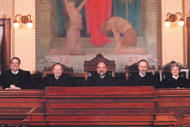8/29/2009
South Dakota Supreme Court Limits Interrogation of TravelersHigh court in South Dakota limits the ability of police to interrogate and search innocent travelers.

The South Dakota Supreme Court on Wednesday limited the ability of police to search and interrogate innocent interstate travelers absent a reasonable and articulable suspicion of wrongdoing. The court considered the unique case of a vehicle search not made pursuant to a traffic stop, but while the owner was being detained before entering his vehicle. The ruling was based on a February 26, 2008 incident at an Interstate 90 rest stop near Spearfish. Sean Haar had parked his Subaru Outback at 3:20pm and went into the building to take a break. While inside, South Dakota Highway Patrolman Brian Swets pulled up on the scene, spotted the Illinois license plate on the Subaru, and parked in such a way as to block the vehicle from leaving.
Swets next snooped in the window of the Subaru and noted the following items in addition to the cargo box on the roof:Haar then left the building and headed for his car -- the temperature was 30 degrees and he was only wearing a short-sleeved shirt. Swets proceeded to block the driver's door of the Subaru so he could interrogate Haar.
- A black duffel bag in the back
- A ski vest on a hanger
- A valid city of Chicago registration sticker on the windshield
- A pair of cell phones
- A large bag
- Food items
- A can of Red Bull
"I had some concerns about some of the things that I saw in his vehicle," Swets explained to the court. "I asked if there was anything in the vehicle that he wanted to tell me about. Anything illegal. I indicated to [Haar] that a lot of times I -- you know, vehicles are parked in a rest area, not moving, sometimes I might take my dog around the vehicle to check for the odor of an illegal drug. Um, I asked him if he had a problem with me doing that."
Haar denied having anything illegal and refused to consent to the search of his vehicle. Swets then told Haar that he was "free to go," even though the trooper was still blocking the Subaru. Swets simultaneously used a remote control to release a drug-sniffing dog from his patrol vehicle. The dog began sniffing the Subaru and found a large quantity of marijuana for which Haar was arrested and convicted. Haar appealed.
The court only considered the question of whether Swets' initial search was justified by a reasonable and articulable suspicion that Haar was involved in some type of wrongdoing. The court first concluded that Haar's questioning was not voluntary.
"We agree with the circuit court that Haar was detained or seized because a reasonable person in his position would not have felt free to leave or terminate the encounter," the unanimous high court ruling stated. "The release of the dog left no room for a reasonable person to believe that he or she could have disregarded Swets's command to the dog, disrupted the canine sniff, and left in his or her vehicle uninterrupted."
Swets freely admitted that the Subaru had committed no traffic violations, there were no signs of intoxication and there was no odor coming from the car. Instead, he found the cargo carrier, lack of luggage and the Illinois license plate to be highly suspicious.
"We fail to see... how a cargo box, the lack of visible luggage in a vehicle that had a cover designed to hide the luggage, and an out-of-state license plate on a vehicle in an interstate rest area provide any articulable basis upon which a reasonable person would have suspected that the Subaru was transporting illegal drugs," the court wrote.
Because the search was the result of an unconstitutional detention, its results were suppressed. The full text of the decision is available in a 130k PDF file at the source link below.


